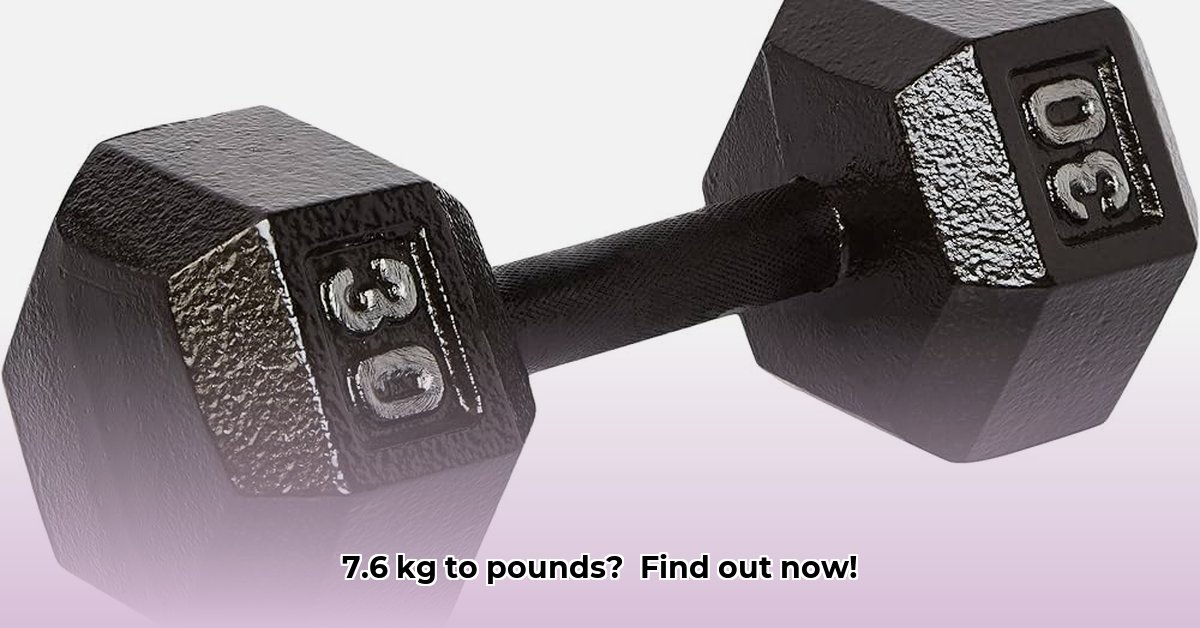
Understanding Kilogram to Pound Conversions
Converting kilograms (kg) to pounds (lbs) is a common task with applications ranging from everyday cooking to high-precision scientific research. This guide provides a clear explanation of the process, highlighting the importance of selecting the appropriate level of precision for your specific needs. The fundamental conversion factor is approximately 2.20462 lbs per kg, but higher-precision factors exist for specialized situations. For a quick online conversion, try this helpful kg to lbs converter.
The Basics of the Conversion
The basic formula for converting kilograms to pounds is:
pounds = kilograms * conversion factor
Let's convert 7.6 kg using two different conversion factors:
1. Common Conversion Factor:
Using the commonly used factor of 2.20462 lbs/kg:
7.6 kg * 2.20462 lbs/kg ≈ 16.76 lbs
This approximation suffices for many everyday purposes like cooking or light shipping. While simple, it introduces a minor margin of error. Is this level of accuracy sufficient for your needs? Consider the impact of a small error before proceeding.
2. High-Precision Conversion Factor:
For applications demanding greater accuracy, the more precise conversion factor of 2.20462262184878 lbs/kg yields:
7.6 kg * 2.20462262184878 lbs/kg ≈ 16.76167 lbs
The difference between the two results is minimal in this case (approximately 0.00167 lbs), but this discrepancy becomes more significant with larger weights and high-precision applications. For instance, in situations like engineering or scientific research, even small errors can have significant impacts. Do the potential consequences of inaccuracy justify the extra precision?
Kilograms and Pounds: Mass vs. Weight
It's crucial to understand the distinction between mass and weight. Kilograms measure mass—the amount of matter in an object—while pounds measure weight—the force of gravity acting on that mass. Although often used interchangeably in daily life, on Earth, this differentiation becomes crucial in scientific contexts. Our conversion essentially translates a mass measurement into a weight measurement, assuming standard Earth gravity.
Precision and Accuracy: When Does it Matter?
The choice between a simple or a precise conversion factor depends entirely on the application. Everyday tasks such as cooking or general shipping often tolerate a small margin of error. However, for scientific research, engineering projects, or pharmaceutical manufacturing, even minor inaccuracies can significantly affect the outcome. A tiny error in a medication dosage, for instance, could have severe consequences.
Real-World Applications of Kilogram to Pound Conversion
This seemingly simple conversion has broad applications:
- Cooking: Converting recipe ingredients between metric and imperial units.
- Shipping: Calculating shipping costs based on package weight.
- Scientific Experiments: Ensuring accuracy in scientific measurements and calculations.
- International Trade: Facilitating commerce across countries with differing measurement systems.
Tools and Resources for Weight Conversion
Numerous online converters and calculators readily perform this conversion. A simple web search will reveal many reliable options. These tools are convenient for quick conversions but understanding the fundamentals is crucial for assessing their appropriateness for any given situation.
Conclusion: Selecting the Right Precision
Converting 7.6 kg to pounds is straightforward, but selecting the right level of precision is paramount. While the simple conversion is often sufficient for everyday use, higher precision is mandatory for fields where accuracy is critical. Consider carefully which precision level is necessary given the context and potential implications of an error.